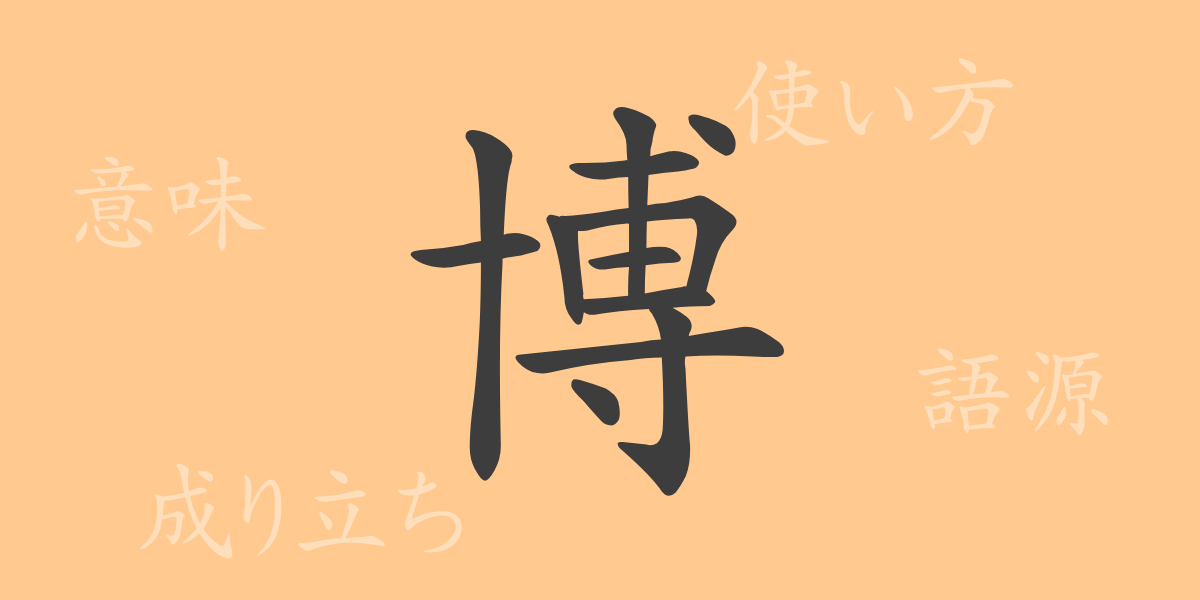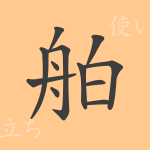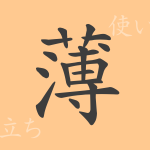In Japanese culture, many kanji characters embody deep meanings. One such character, *”博”* (はく/haku), is frequently used across various fields. This article explores the rich history and meanings of the kanji “博,” along with commonly used idioms and phrases featuring it. Join us as we delve into the world of “博” to catch a glimpse of Japanese cultural nuances.
Origins of “博” (はく/haku)
The kanji “博” (はく/haku) originated in ancient China. Derived from pictographs, this character initially represented the image of outstretched hands, symbolizing the idea of “reaching broadly” or “expanding.” Over time, its meaning evolved to signify “possessing extensive knowledge” and “covering a wide range,” reflecting its use today.
Meaning and Usage of “博” (はく/haku)
The kanji “博” (はく/haku) means “broad,” “to expand,” or “to cover a wide range.” It is used in words like “博学” (はくがく/hakugaku) meaning “extensive knowledge,” and “博愛” (はくあい/hakushugi) meaning “universal love.” In the context of gambling, “博” (はく/haku) implies “investing broadly,” as seen in the word “博打” (ばくち/bakuchi), which means “gambling.”
Reading, Stroke Count, and Radicals of “博” (はく/haku)
The kanji “博” (はく/haku) has various readings and associated meanings, depending on the context.
- Reading: The *on’yomi* (音読み) reading is “ハク” (haku), and the *kun’yomi* (訓読み) readings are “ひろ(い)” (hiro[i]), “ひろ(まる)” (hiro[maru]), and “ひろ(める)” (hiro[meru]).
- Stroke Count: It consists of 12 strokes.
- Radical: The radical is “十” (じゅう/jū), meaning “ten” or “complete.”
Idioms, Phrases, and Proverbs Featuring “博” (はく/haku)
The kanji “博” (はく/haku) appears in many idioms and phrases, reflecting its diverse meanings. Here are some examples:
- *博学多才* (はくがくたさい/hakugakutasa): Describes someone who is knowledgeable and multi-talented.
- *博愛主義* (はくあいしゅぎ/hakuaishugi): Refers to the philosophy of universal love and equal affection for all people.
- *博士号* (はくしごう/hakushigō): The highest academic degree, equivalent to a Ph.D.
- *博覧強記* (はくらんきょうき/hakurankyōki): Indicates someone who has read widely and remembers well.
- *博打を打つ* (ばくちをうつ/bakuchi o utsu): Means to engage in gambling.
Summary of “博” (はく/haku)
The kanji “博” (はく/haku) holds a wide range of meanings, from its origins to its diverse uses in modern Japanese. It encompasses knowledge, love, and even gambling, illustrating its extensive applications. Understanding “博” and skillfully using related idioms and expressions can deepen one’s appreciation of the richness of the Japanese language. We hope this article aids in your understanding of “博” and enriches your exploration of kanji.

























